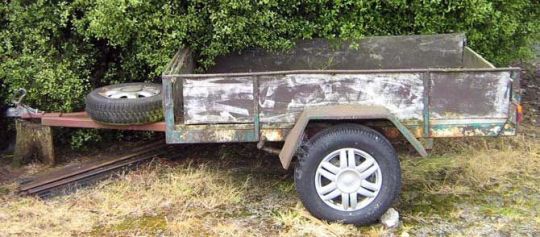Buying a Used Trailer

If you are buying a used trailer and not quite sure what you are looking for, do some research and get a second opinion from your local mechanic or engineer The list below details most of the critical things to look for.
If you are going it alone to check out a used trailer, take a pair of overalls, torch, a car jack and small hammer with you and get under the trailer and give it a good check out. Before you venture on top or under any trailer, make sure the wheels are chocked and the trailer is safe.
The following is a checklist of some of the more important things to look at before purchasing a used trailer –
Overall condition – a quick glance over the trailer will give you some idea how worn and treated the trailer has been; it is normal to find dings and dents in the panel work and the odd bent tie rail or fender. Paintwork and galvanizing may be compromised in a couple of places, and the condition of the deck, depending on the material used and the trailers age, will give away whether the trailer has been looked after or abused and overloaded.
Tongue – any damage, bend or twist in the tongue can be cause for concern: the strength of the tongue may be compromised and the trailer may not tow true, which in turn can cause trailer sway and worn tires, or in the worst case scenario - an accident.
Coupler wear – hook the trailer onto your tow vehicle, making sure that the coupler and hitch ball are matched sizes, and give the tongue a good jiggle side to side and up and down and see if there is any play within the coupling. On a heavy trailer where this is not possible without doing yourself an injury, take a new hitch ball with you and insert it into the coupler head.
Deck condition – this is wholly dependent on the type of deck material used, but if it is a steel or alloy deck, look for corrosion, broken welds and rivets/fasteners. Get on the trailer and have a good jump around to determine if the deck is loose in any areas. This may also help indicate loose or poor suspension. With a plywood or timber deck, again check for any damage, loose fasteners, de-laminating and rot.
Tires – check all tires are matched sizes and check the condition of the tread. Uneven wear across the width of the tire will indicate a problem with wheel misalignment, which could be one of several issues (axle misalignment, faulty hubs/bearings or previous overloading of the trailer).
Wheel Bearings - Jack the trailer up and spin the wheels. Listen for any rumbling noises or rough rotation which could indicate worn wheel bearings. With the trailer jacked up, firmly grasp each tire and check for movement side to side as well as top to bottom. If any movement is felt, the bearing will need to be re-seated or replaced.
Tailgates/Ramps – operate all the latches and tailgates/ramps and make sure all is working as it should. Check the hinges for excess wear and any cracked or broken welds. Also check that the tailgates/ramps are straight and close easily and securely.
Fenders – Check that the fenders are securely attached to the trailer and there is minimal damage/corrosion. Fenders normally are the most abused things on a trailer, from taking the hard knocks to being used for seats, steps and as mobile workbenches.
Tie hooks – check the condition of the tie hooks and tie rails for wear and how securely they are attached to the trailer, and also importantly, that there enough of them and that they are tough enough to do the jobs you need the trailer for.
Lights – Hook up your vehicle and with assistance, check all the lights are working correctly. Make sure the lights are matching and are in good condition. Check for any water or impact damage and also for any lens fading from sun exposure. Give them all a wiggle to make sure they are secure.
Under chassis – chuck your overalls on and take a torch and your small hammer and crawl under the trailer (chock the wheels first). Check every part of the chassis for any signs of damage, broken welds, and corrosion. Give the chassis a tap with the hammer and listen to the sound coming back to you. Normally if the noise is a good sharp steel on steel noise, the underlying condition of the steel is good. If the sound is dull and non-resonating there is a good chance of corrosion within.
Bubbling paint or discolored galvanizing are good signs of corrosion. Look especially around where the tongue is attached to the chassis and the suspension. Check the condition of the axles, springs and spring hangers and slippers for any damage or corrosion.
Leaf springs will normally have some signs of dry powdery rust around the leaves but if the outer edges of the springs are tapering the trailer has had a lot of use and has possibly been overloaded. Cracked springs are also an indicator of this.
With torsion suspension, the angle of the torsion bar with the trailer unloaded will give some indication of the condition of the rubber inserts. Check the wiring for the lights if possible and look for any fraying or rubbing against the chassis, loose cables or poorly connected junctions.
Be realistic when deciding whether you want to undertake any major repairs on a used trailer (for example - replacing a bent tongue or corrosion removal) as the expense and time may far exceed the initial price of the trailer